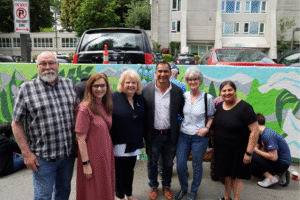 Today, Vancouver City Council unanimously approved a comprehensive Seniors Housing Strategy to address the urgent need for more housing options and supports for older adults.
Today, Vancouver City Council unanimously approved a comprehensive Seniors Housing Strategy to address the urgent need for more housing options and supports for older adults.
“We are proud to launch the City’s first Seniors Housing Strategy that honours and supports all generations,” said Mayor Ken Sim. “This Council is focused on ensuring our seniors can access safe, affordable, and supportive housing across our city. We look forward to working with senior levels of government to ensure Vancouverites of all ages have a place to call home.”
With a commitment to collaboration with Vancouver Coastal Health, BC Housing, and community partners, the strategy outlines five key directions implemented through 24 actions focusing on key policies, partnerships, and advocacy efforts.
“The overarching goal of Vancouver’s Seniors Housing Strategy is to ensure elders and older adults can age in their communities with dignity and security,” stated Josh White, General Manager, Planning, Urban Design & Sustainability. “Through regulatory tools, advocacy efforts, and strategic partnerships, we aim to bolster housing that is affordable and tailored to the needs of our senior community.”
Key Actions:
- New rezoning policy to increase supply: To enable more housing options for seniors across all neighbourhoods in Vancouver, ensuring older adults can age in their community in affordable housing and with the care and supports needed.
- New Resident Relocation Policy with added protection: Establishing more protections for seniors living in Community Care and Assisted Living Residences in the event of a redevelopment.
- Updated Design Guidelines to promote high quality architecture, dignified care, and access to activities of daily living for older adults and other residents: Encouraging new long-term care, assisted living, and seniors supportive or independent housing developments to meet the specific needs of older residents.
- Provincial Partnerships and Advocacy for more funding and supports: Championing significant improvements to the Province’s Shelter Aid for Elderly Renters (SAFER) Program to ensure low-income seniors renting in the private market are able to remain in their homes. Working in partnership with senior levels of government to deliver more affordable housing options, including exploring the development of a campus of care building, and with a focus on new supportive housing targeted towards seniors.
Moving forward, the City remains committed to evolving the strategy in alignment with future policy developments and community needs, as we advance broader work to become an age-friendly city. Recognizing the multifaceted nature of supporting older adults, the strategy underscores the importance of ongoing collaboration with stakeholders across all levels of government and senior-serving organizations to ensure the needs of older adults are met.
Background
Vancouver’s senior population is growing rapidly, with over 194,000 residents aged 55 and older currently residing in the city. This demographic is expected to increase substantially over the next two decades, particularly among those aged 75 and older.
Key statistics:
- One in five B.C. seniors rent their homes and need financial relief (BC Seniors Advocate 2024 report); in Vancouver, this need is even higher with 30 percent of older adults renting.
- In 2021, 14,000 senior-led Vancouver households aged 55 and up paid more than 30 percent of their household income on rent with one third of those households spending over 50 percent of their household income on rent (Statistics Canada).
- In 2023, 43 percent of people on the social housing waitlist in the City of Vancouver were 55+ (2,420 persons), even though older adults 55+ made up only 30 percent of the City’s overall population (Metro Vancouver).
- 21 percent of people experiencing homelessness in the City of Vancouver are aged 55 or older, with about half first experiencing homelessness when they were already a senior (2023 Homeless Count).
This Seniors Housing Strategy marks Vancouver’s first dedicated effort to address the unique housing needs of its aging population. It underscores the City’s commitment to improving the overall well-being of older adults through targeted housing and support services, alongside broader initiatives with City partners.








